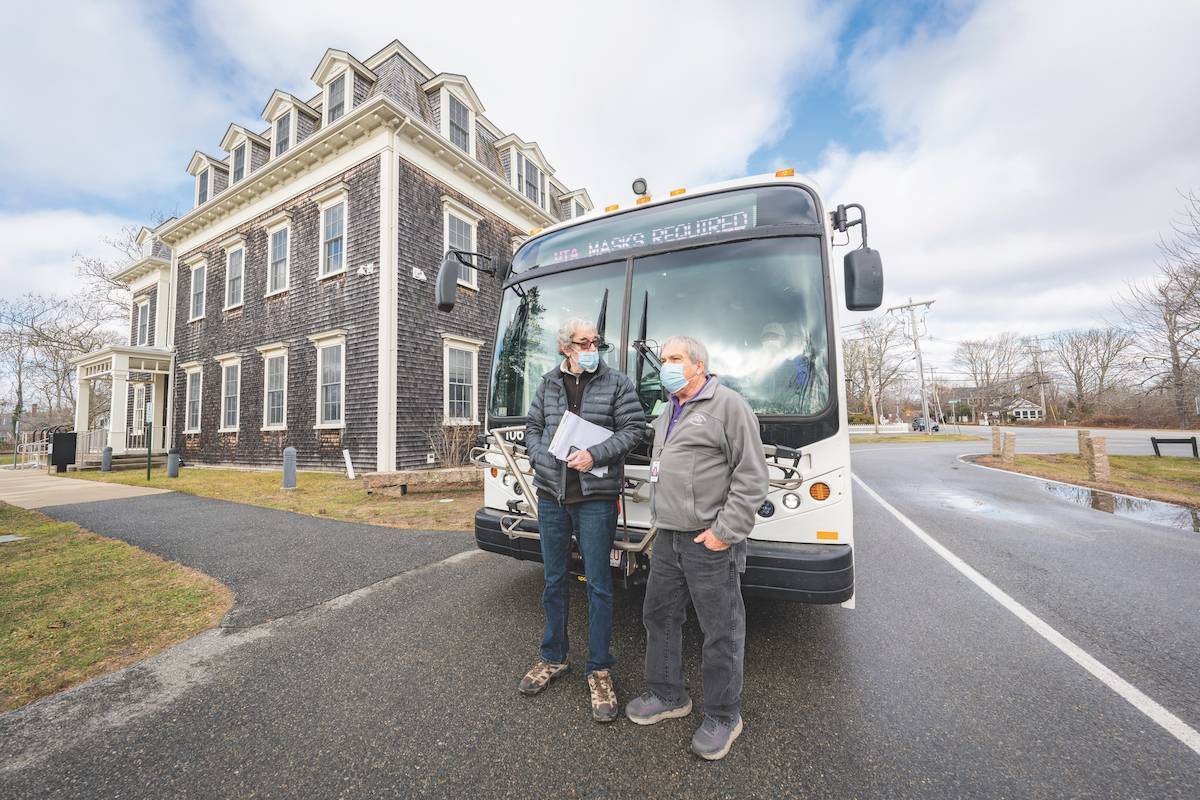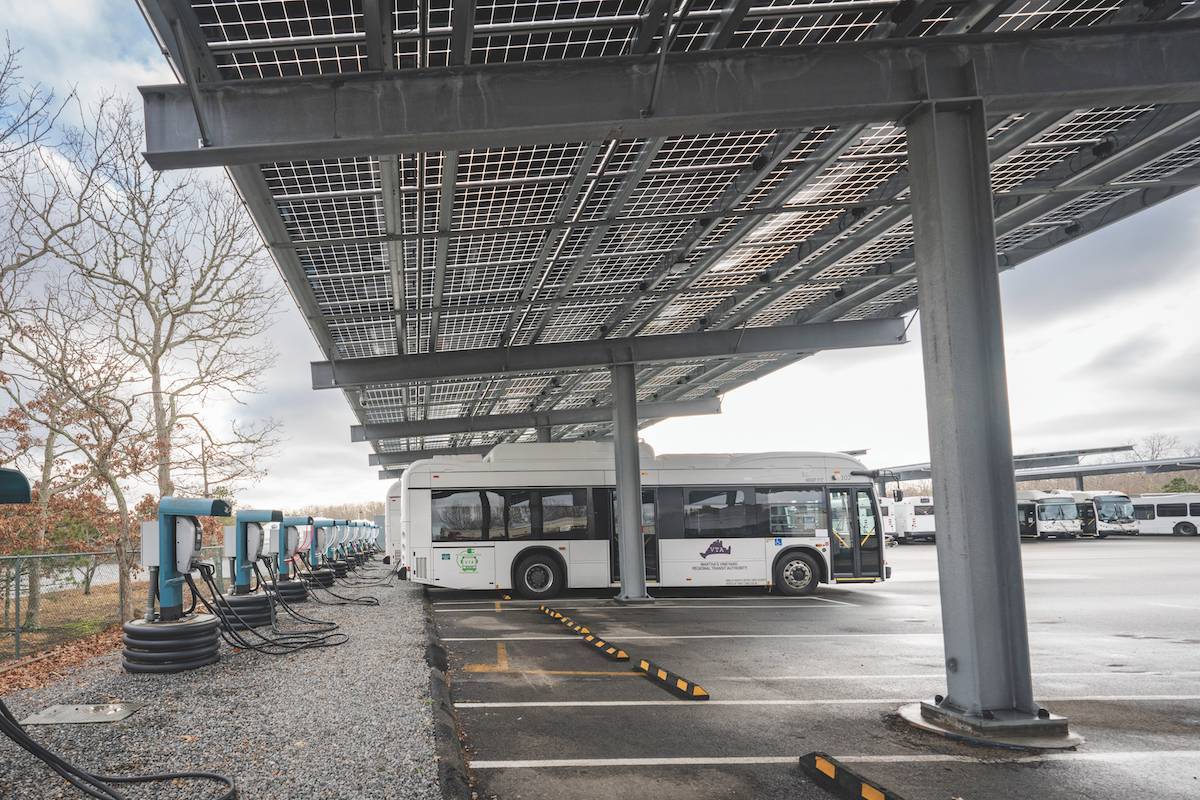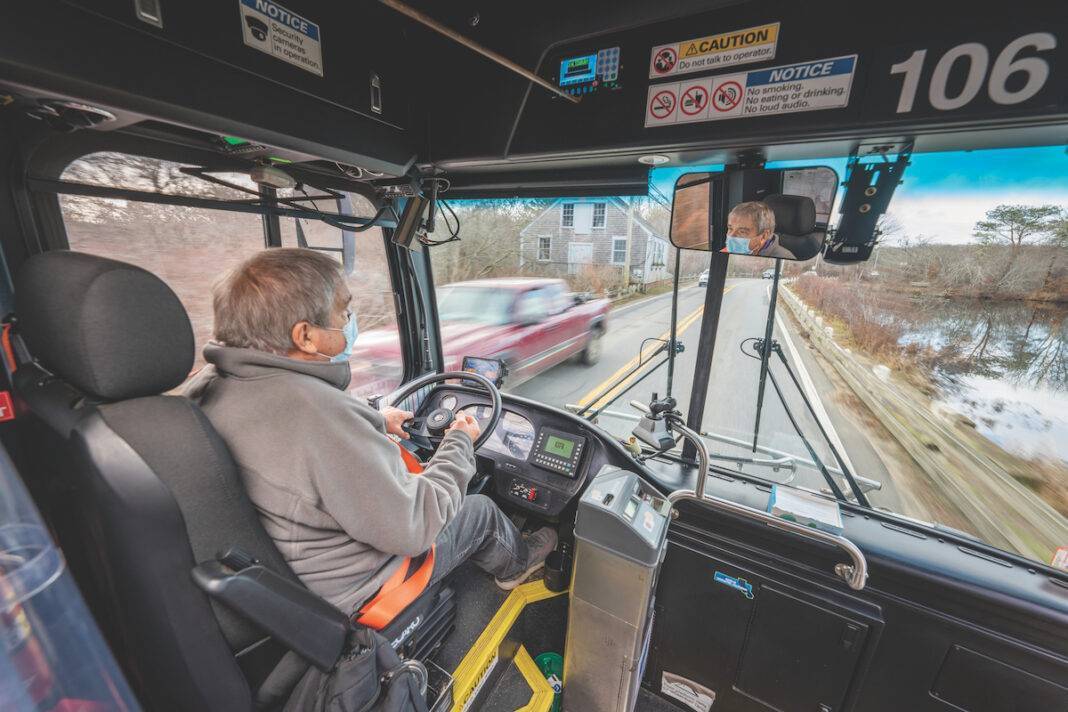On New Year’s Eve afternoon of 2021, I boarded the route #3 bus from the Steamship Authority in Vineyard Haven to ride out to the West Tisbury Town Hall with Andre Bonnell at the wheel. Bonnell has been with the Martha’s Vineyard Transit Authority (VTA) for 25 years and he has been tapped to be the unofficial goodwill ambassador for the VTA’s line of electric buses.
“I came to the Island for the weekend in June of 1970,” Bonnell tells me as we head toward West Tisbury, “and I’m still waiting for Monday to come around. So I guess you could say it’s been a very long weekend.” And there, in a nutshell, you have Andre Bonnell, an amiable guy with a gift for gab and more one liners than Shecky Greene.
“I’ve got a corner office with a beautiful view,” he said. “ I get paid to travel and to drive the company’s $700,000 vehicle.”
Speaking at a ceremony last spring announcing the $4.5 million solar energy project (which includes seven solar canopies at the VTA headquarters in the Airport Business Park), Bonnell likened the conversion from diesel to electric as going from the “Fred Flintstone” era to the “George Jetson” era of transit.
“I love driving these electric buses,” Bonnell says, “because they’re a lot easier to handle. And our customers seem to love them as well. They’re quieter and they’re loaded with USB ports so people can charge their cell phones or tablets.” Bonnell says that riders especially like them in the summer months because of the air conditioning. “With the old diesel models,” he said, “we used to have what we called 20/40 air conditioning … we’d open twenty windows and go 40 miles per hour.”
Bonnell says that the VTA has been running electric buses for two years now and that people seem to really notice the difference. “A lot of people from off-Island have never seen electric buses and they comment on how peppy the buses are, and how they like all the accessories. It makes me proud to show off our Island and demonstrate how we’re one step ahead.”
Electric buses are more than four times translating into a 40,668-metric ton reduction in carbon dioxide emissions over the 12-year service life of the buses.
Bonnell goes on to explain the economies of having electric buses and how, compared to diesel buses, there’s relatively low maintenance. “The old diesel buses were not meant to run at low speeds,” Bonnell said. “They’re meant to run long distances at higher speeds, so as a result, when they’re used on the Island with lots of stops and starts, they end up spending a lot of time in the shop.”
Bonnell explained that the VTA maintenance crew had to go back to school to learn how to deal with the new electric buses. In a way, they had to go from being mechanics to being electricians. In the end, there is less maintenance because there’s no internal combustion engine anymore. “It’s sort of a white glove thing,” Bonnell said. “They don’t have to get their hands so dirty any more.”
Angie Gompert, the VTA administrator, told me on the phone that the electric buses are more than four times as energy efficient as diesel buses and will save an estimated 336,000 gallons of diesel fuel, translating into a 40,668-metric ton reduction in carbon dioxide emissions over the 12-year service life of the buses. This is the equivalent of taking 8,500 passenger cars off the road for a year.


“At this point, 16 out of the 32 VTA buses are electric,” Gompert said, “and moving forward we won’t be replacing any diesel buses. Our goal is to go entirely electric, and the same applies to our fleet of vans and cars.”
Gompert explained that funding for the electric bus program came from several sources. ”We have received four years of low or no emission (LoNo) funding for transit buses from the Federal Transit Authority (FTA) as well as $2.3 million for the differential costs of converting diesel buses over to electric. We’ve also received about $3.8 million from the MassDOT Regional Transit Authority Capital Asset Program (RTACAP), and then there was the $3.9 million that came from Volkswagen.”
As you may recall, about six years ago Volkswagen was fined for lying about their emissions. A settlement distributed significant funding to each state. The VTA’s share from the state of Massachusetts was $3.9 million.
After about half-hour on the road, Andre and I arrived at the West Tisbury Town Hall and Bonnell’s shift was over. From there, he’d be taking one of the VTA’s electric cars, a Hyundai Kona, out to the VTA headquarters to pick up his car.
Bonnell seemed to like the Kona nearly as much as his electric bus, with one added advantage — it’s a whole lot easier to park.

